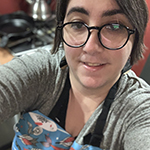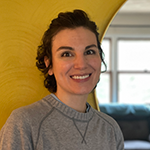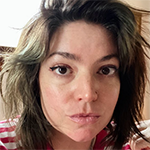Blue Hair and Deadname
I’ve told the receptionist my full name and date of birth, so I know there’s a problem when she pauses, then asks what time my appointment is for. I tell her.
“Has anything changed?” she asks.
“No,” I say. I’m not sure when I last came to this clinic, so it’s not a lie, exactly, but I doubt it’s true. Some recent changes, depending on how you define recent, are: I’ve gotten married, I’ve changed my legal name and gender, and I’ve had a hysterectomy and phalloplasty. Why did I tell her no? I know why, though: there’s a woman at the next window over who’s checking in multiple children for appointments. I don’t want to out myself to her, and besides, my receptionist has already been sighing and asking me to repeat myself due to the noise of the adjacent check-in.
“Actually, I’m gonna need to see your ID, too.” Relief. My driver’s license is up to date. She can see my name and fix anything outdated in the system without me needing to say it out loud.
In the hallway to the waiting room, I shoot my wife a quick text: the worst is over
In the waiting room, there’s a slender, lightly muscled person with short, brown and blue hair, whom I register as likely kin, sitting along one long wall, and some guy sitting along the other. I take a seat in the middle.
After a few minutes, a medical assistant emerges for me.
“M——?”
Oh fuck. Fuck! I can’t answer to that. I won’t.
In the more-than-a-year since I legally changed my name, I’ve never been publicly deadnamed. I look up at the MA reflexively, the horror on my face probably telegraphing that I have some connection to this name, even though I won’t acknowledge it as my own. To correct her, though, would be to announce to the other patients in the room that I’m trans, not to mention granting them the intimate knowledge of who I was before I transitioned. I can’t. I won’t.
She calls it out again. This time I pointedly ignore her. I ignore everything, especially the man sitting somewhere across from me. I let the MA walk back into the clinic without a patient.
I sigh deeply and immediately regret it. Great, more evidence for the other patients that whatever just happened, it was about me. Trying to keep my affect perfectly even now, I text my wife that they deadnamed me. What do I do? I don’t need this appointment. I’d be fine with walking out, but I have to let some time pass, or I’ll make myself even more conspicuous to the other people here. I’ll walk out, but I’ll give it maybe 15 minutes first.
The MA is back.
“Kevin?” Across from me, Kevin rises and follows her back without issue or complaint. Kevin. How nice for Kevin.
The MA is back for me before long.
“Last name R——?”
I have to acknowledge this, I think. I rise reluctantly and come to stand near her in the hall, not passing through the door yet.
“And what was the first name?” she asks.
“Birch,” I say, trying not to let the humiliation or frustration show; it’s not her fault the paperwork she’s looking at has the wrong name.
But it’s someone’s fault. My doctor’s referral would have been for my legal name, my correct name, my real name, and the receptionist should’ve seen my name on both my driver’s license and my insurance card. Maybe this is the receptionist’s fault.
“How do you pronounce that?” the MA asks. It’s a reasonable question for my deadname, but not for the one I just told her.
“Birch,” I repeat. My deadname is multisyllabic and sounds nothing like Birch.
“And date of birth?”
I answer, although my legal last name, the only one anyone in the medical system has ever heard, is a lot more distinctive than Rosen. This isn’t a case of two people who just happen to share a last name, and I think we both know it, but neither of us break from the charade.
“Okay, it just has a totally different name here,” she says. “Let me just go back real quick.”
I return to my seat, keeping my body language as neutral as possible while directing my gaze down and straight in front of me. I’m keenly aware there’s still someone else in here waiting, who’s overheard all of this, who knows I’m M——. I know they can see me, so the best I can do is not see them.
“Doctor’s offices, huh?” a voice from behind me says.
I don’t have casual conversations with strangers. I crave the ease of connection with the cashier, the barber, the person in front of me in line, but it’s rarely my experience. Most small talk I could make (what I do for work; what I’ve been up to, today or ever) is only one or two questions removed from my transness. It’s not that the topic is off limits, just that I’m selective about who I allow to engage with me about it.
But I turn around in my chair, remembering for the first time the specifics I observed about the only other person left in the room with me. Blue Hair here has instantly become my new best friend, a witness who actually understands. With Kevin gone, this waiting room is a two-person trans space.
We’re both masked, so I put as much expression as possible into my answering eyebrow raise and eye roll. I hope my smirk comes through. I sigh loudly, on purpose this time.
“‘How do you pronounce that?’” I quote back, bringing a hand to my forehead and allowing my previously stifled exasperation to overtake my face.
“Not like that!” Blue Hair answers, roleplaying as me. Bless you bless you bless you. “That’s the worst way to pronounce it!”
Their levity restores me to myself. I don’t thank them out loud, the words in my heart feeling both too much and not enough, but I hope they can see what they’ve done for me.
The MA returns, this time asking for Birch. I give Blue Hair a masked smile and a little wave, which they return, on my way out of the waiting room.
The appointment, despite the pain it’s already caused me, is as quick as I’d imagined—over within five minutes—and as pointless, yielding a benign diagnosis I don’t care about and a follow-up care plan of never coming back here.
I look for Blue Hair on my way out, but they’re gone.
I wish I’d asked their name.
Birch Rosen (birchrosen.com) is a trans nonbinary writer living in the Seattle area on the unceded land of Coast Salish peoples. Their work has appeared in Michigan Quarterly Review, Bellevue Literary Review, and From the Waist Down: The Body in Healthcare (Papeachu Press). They are the 2022 winner of the King County Library System poetry contest and the author of the zines Boobless, T&A (Transitioning & Attractiveness), and the Trans Restroom Rants series. Find them @birchwrites.


 BACK TO ISSUE
BACK TO ISSUE


